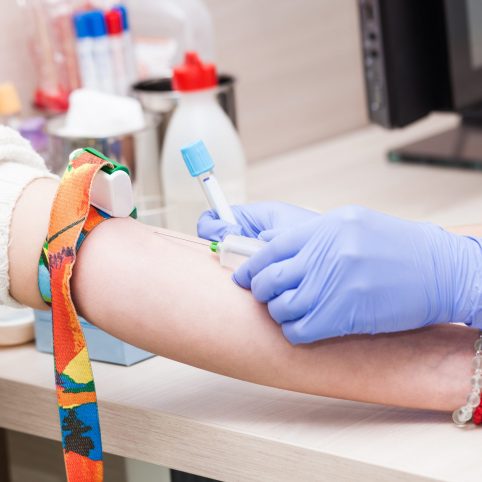How is Haemophilia Treated?
Unlike 70% of people with bleeding disorders across the world, patients in Ireland have access to the safest and most effective haemophilia treatment available. The treatment of bleeding disorders has improved over the last decade with new types of products changing the way we think about treatment. There are two basic types of treatment approaches:
-
- On demand – This is treatment received in response to a bleed which may have occurred after an injury or accident or may have been spontaneous. The aim of this is to stop the bleed once it has started. Each bleeding episode must be promptly treated by an intravenous (into a vein) infusion of the clotting factor which is deficient. Once the bleeding stops, pain rapidly diminishes and use of the limb returns. The requirement for rapid treatment has meant that the vast majority of treatment in those with severe haemophilia are treated at home where the person with haemophilia or the parent has been trained to administer the treatment. In addition, planned on-demand treatment may also be used prior to some dental treatment, surgery, or childbirth.
-
- Prophylaxis – This is treatment taken regularly, to prevent bleeding from an injury before it requires further interventions. This is where the most advances have been made in the bleeding disorder community to make it easier to protect from bleeding and reduce the impact of even 1 or 2 bleeds a year, on long term joint movement and pain.
Prophylactic (Preventative) Licensed Treatment Options
Standard half-life (SHL) treatment
Standard half-life treatment is a prophylactic treatment option. With SHL, the missing clotting factor concentrates are injected into the blood and stay there for a relatively short period of time, therefore requiring repeat injections – every 2-3 days for Haemophilia A and twice a week for Haemophilia B.
Extended half-life (EHL) treatment
These products stay in the bloodstream for longer than SHL products. Therefore people may choose to infuse less often than with SHL, meaning that those with Haemophilia A would need to infuse twice per week while those with Haemophilia B would need to infuse once per week, once every ten days or once every two weeks. Alternately, individuals may choose to infuse the same amount and frequency of infusion as with the SHL product in order to maintain a higher trough level (lowest level the factor falls to before the next injection). A person may choose to do so if they are very active or plays sports that may lead to injuries.
Non-Factor Replacement Therapy
This is a new type of therapy, used to treat Haemophilia A. It provides a prophylactic effect, but without the use of factor concentrate. Currently there is only one product licensed, Emicizumab. Emicizumab mimics the action of factor VIII and is known as a “mimetic” treatment for this reason.
There are several benefits of using non-replacement therapies, which are as follows:
-
- They provide a consistent level of protection without peaks or troughs.
- As there is no actual clotting factor infused, an individual using this therapy will not develop factor VIII inhibitors from the treatment.
- They are given subcutaneously (under the skin), instead of intravenously and therefore have been described as a ‘game-changer’ in treatment.
- They have a long half-life so the number of injections per month is less.
Emicizumab is a treatment for prophylaxis and cannot be used if there is a breakthrough bleed. In the event of a bleed the individual would have to use a bypassing agent if they have inhibitors to treat the bleed or factor concentrate if they have factor VIII deficiency.
The current predominant specific therapies used for treatment of haemophilia in Ireland are as follows:
Haemophilia A
- Elocta (EHL FVIII)
- Emicizumab (Hemlibra)
Haemophilia B
- Alprolix (EHL FIX)
Treatment Options In the Pipeline
Gene therapy
Gene therapy for Haemophilia A and B have been under development for many years. In recent years, the majority of clinical trials have been based on the use of an adeno associated viral (AAV) vector for the delivery of the gene therapy genetic material to the liver cells. The vast majority of the genetic material delivered to the cells do not integrate into the existing DNA but sit separately within the cells and produce either factor VIII or factor IX.
There are currently 16 gene therapies in clinical trials in phase 1 or 2 and 5 in phase 3. The first hemophilia gene therapy to be licensed was a factor VIII gene therapy, Roctavian, which was licensed by the European Medicines Agency (EMA) in September 2022. The first factor IX gene therapy, Hemgenix, was licensed by the FDA in the USA on November 22, 2022, and was licensed by the EMA in 2023.
Gene therapy is an irreversible one-off therapy which cannot be repeated due to the fact that the individual will develop antibodies to the AAV vector once they have received the therapy, thereby preventing them from being re-dosed. Eligibility for gene therapy will be for those with severe hemophilia over the age of 18, without a history of inhibitors, without serious liver disease and without preexisting antibodies to the AAV vector. Hemgenix, the first factor IX gene therapy to be licensed, can be used in individuals who have pre-existing antibodies to that vector, but that is an exception. It is anticipated that 40% to 50% of people with severe factor VIII deficiency will be theoretically eligible for gene therapy and 40% to 60% of those with severe factor IX deficiency will be theoretically eligible (due to the ability to dose those with pre-existing AV antibodies for one of the factor IX gene therapies.)
If you would like further information about gene therapy please see our Gene Therapy page and to learn more about treatment products in the pipeline, please consult our Novel Therapies booklet
Coagulation Rebalancing Therapies
In addition, there are other prophylactic treatment options in the pipeline. Several of the novel non-replacement therapies undergoing clinical trials are so-called rebalancing agents. They act by inhibiting existing naturally occurring anticoagulants which normally prevent people from clotting excessively. The rebalancing agents under development include:
- anti-tissue factor pathway inhibitors (anti-TFPI), (Concizumab or Marstacimab)
- anti-thrombin inhibitor (Fitusiran)
- activated protein C inhibitor (Serpin PC)
Also under development are competitors for emicizumab including MiM8 and a new extended half-life factor concentrate – BIVV 001 – which links the factor VIII molecule to a portion of the von Willebrand molecule, thereby increasing the half-life. The clinical trial for this extended half-life factor VIII with a once per week infusion can give a trough level of up to 17%. Therefore, this should comfortably allow for intravenous prophylaxis once per week with a higher level of protection if and when this product is licensed.
Licensed Therapies and those under development
For more information on licensed therapies and those under development in clinical trails, see the table below.
| Licensed Therapies – Haemophilia A | Licensed Therapies – Haemophilia B |
|
Clotting Factor Concentrates Human plasma derived single factor (35) By-Passing Agents (for Inhibitors only) Human plasma Activated Prothrombin Complex (aPCC) (FEIBA) Sevenfact ( transgenic FVII) Non-Factor replacements (Prophylaxis only) Bi-Specific Antibodies – Emicizumab ( Hemlibra) Adjunct (supplementary or other therapies) Adjunct Therapies DDAVP/Desmopressin Gene Therapy – Roctavian (EMA) |
Clotting Factor Concentrates Human plasma derived single factor (18) By-Passing Agents (for Inhibitors only) Human plasma Activated Prothrombin Complex (aPCC) ( FEIBA) Adjunct Therapies Tranexamic Acid Hormone treatment (Women/Girls)
Gene Therapy – Hemgenix |
Currently under development- in clinical trials |
|
|
Clotting Factor Concentrates Non-Factor replacements (Prophylaxis only) |
Clotting Factor Concentrates Non-Factor replacements (Prophylaxis only) Rebalancing Therapies Gene Therapy Gene Editing |
Comprehensive Care
Comprehensive care for individuals with a bleeding disorder is a multidisciplinary approach. This means that patients are taken care of by different medical professionals who address different aspects of their care to enhance the management and outcome of the treatment. In Ireland, patients can access comprehensive care services in their Comprehensive Care Centre. The Comprehensive Care Centre will provide a tailored treatment programme for people with haemophilia or related bleeding disorders. Besides the haematologists, patients receive access to other medical professionals and specialities, as follows:
- Physiotherapy and orthopaedic care
- Surgery
- Dental care
- Paediatric care
- Hepatology and infectious diseases
- Obstetrics and gynaecology
- Genetics
- Psychosocial support

To view the most recent treatment guidelines set out by the National Haemophilia Council (NHC) click here.
